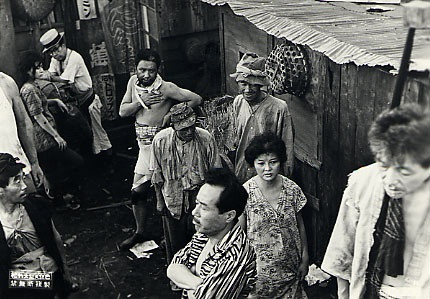
Shochiku Nouvelle Vague 2007 / Taiyo no hakaba / Japan 1960
In terms of morbid views of the world, the frescoes from the poorest part of Osaka outdo even the typically gloomy films of the foremost of Japanese rebel directors. The antiheroes “from the dregs” are dominated by Hanako, who makes her living by day through illegal blood trafficking and, at night, works as a prostitute.


In terms of morbid views of the world and hopeless fates, the frescoes from the poorest part of Osaka outdo even the typically gloomy films of the foremost of Japanese rebel directors. The antiheroes “from the dregs” are dominated by Hanako, who makes her living by day by illegally trafficking the blood of destitute slum-dwellers for cosmetic use. At night she works as a prostitute. No wonder then that Hanako caves in to the magic of young new arrival Takeshi, who brings signs of humanity to the omnipresent violence and life at the expense of others. The leader of the street gang, good-looker Shin, also finds a fondness for Takeshi and tries to corrupt him for his own purposes. Once Takeshi decides to tear himself away from his environment it’s already too late. The semi-documentary style completes the visual stylisation of a bombed out and god-forsaken wasteland, over which even the bloody sunrise portends nothing good.
87 min / Color, 35 mm
Director Nagisa Oshima
/ Screenplay Nagisa Oshima, Toshirô Ishido
/ Dir. of Photography Takashi Kawamata
/ Music Riichiro Manabe
/ Editor Keiichi Uraoka
/ Producer Tomio Ikeda
/ Production Shochiku
/ Cast Kayoko Honoo, Masahiko Tsugawa, Isao Sasaki, Fumio Watanabe
/ Contact Shochiku Co., Ltd., The Japan Foundation

Nagisa Oshima (b. 1932, Kyoto) comes from a family of samurai. The most famous and most controversial of the young directors, Oshima sparked off the New Wave in Japan with his debut A Street of Love and Hope in 1959. He had a penchant for literature and poetry in his adolescence and in college became a leading activist in the leftist movement. A direct political dimension, often on the border with documentary, and the influence of the French New Wave, particularly Godard, are evident in the majority of his films, which he got the opportunity to make after working for six years as an assistant in the Shochiku company. His work is replete with fierce criticism of his society that secluded him even after his departure from Shochiku when he began working independently. The apex of his work may be considered In the The Realm of the Senses (Ai no korida, 1976), a scandalous tale of sexual obsession based on a true story.
Shochiku Co., Ltd.
4-1-1 Tsukiji, Togeki Bldg. 12th Floor, Chuo-Ku, 104 8422, Tokyo
Japan
Phone: +81 355 501 623
Fax: +81 355 501 654
E-mail: [email protected]
The Japan Foundation
4-16-3 Yotsuya, Shinjuku-ku, 160-0004, Tokyo
Japan
Phone: +81 355 623 535
Fax: +81 355 623 500
E-mail: [email protected]

Junko Kawaguchi

Marie Suzuki
Institution
First-hand brews throughout the year.
Be among the first to learn about upcoming events and other news. We only send the newsletter when we have something to say.